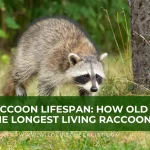Do Raccoons Have Salivary Glands?

Raccoons are just like every other mammal that have salivary glands. In context, they have about three main salivary glands, which are parotid, submandibular, and sublingual. These glands secrete saliva that aids the moistening, the start of chemical digestion, and swallowing by raccoons.
In raccoons, the largest salivary glands are what we call parotid glands, and they produce a saliva called Serous saliva. This saliva is watery and it contains enzymes that break down lipids and carbohydrates. The submandibular glands produce thick, mucusy saliva and serous fluid and the primary output of the sublingual glands is mucus-rich saliva
Raccoons do not have major adaptations in the salivary glands. They look like the salivary glands that are found in many carnivoran animals, saliva production, in size, and capacity. Also, the saliva of a raccoon contains the enzyme called Amylase which helps to break down the starches, and electrolytes such as sodium and potassium.
When Raccoons eat, they solely rely on their salivary production to soften, manipulate, and allow them to swallow all kinds of foods such as insects, crustaceans, fruits, and seeds.
Contents
Do Raccoons Need Water When They Eat?
Raccoons use water to strengthen their vision in a similar way to how humans do. Water increases the sensitivity of the touch nerves, giving the raccoon additional information concerning the food. The way it accomplishes this is by making the raccoon’s paw’s nerve endings more responsive.
This is essential because of the diverse diet raccoons can eat, and they must be able to identify those few foods that they are not allowed to eat or that are not part of their approved diet.
Why do Raccoons Wet Their Food?

Raccoons wet their food before they eat them, despite having salivary glands. Many people believe they do this to clean it, but that’s not the case. Scientists have thought raccoons might have dry mouths or not enough saliva glands, but research has shown otherwise.
The real reason raccoons wet their food is to know more about the food through the nerves in their paws. By wetting their food, raccoons can better understand what they are eating. Unlike humans, who rely heavily on sight to understand their surroundings, raccoons mainly use touch to gather information.
When a raccoon touches something, it gets about two-thirds of its sensory information from cells in its paws that interpret different sensations. Their paws have a lot more receptors than most other animals, like four or five times more. This lets raccoons hold, move, and understand things just like humans and other animals with hands.
Water is really important for a raccoon’s sense of touch. It helps the nerves in their paws work better and makes their sense of touch much stronger. In a study from 1986 published in a journal called Somatosensory Research, researchers looked at 136 raccoons and found that wetting their paws made them much more sensitive.
The way raccoons use water to make their sense of touch better is a lot like how humans use light to see better. When light goes into our eyes, it makes our nerves there work better and helps us see things more clearly. When water touches a raccoon’s paws, it makes their touch nerves work better and gives them more information about what they’re touching.
This is important because raccoons eat a lot of different things, even stuff they find in garbage cans, so they need to know what’s safe to eat and what’s not.
Is Raccoon Saliva Dangerous to Human?
Raccoons are known to be carriers of different diseases like Rabies, so if you get exposed to bodily secretions or feces from raccoons, you can get infected. Bodily fluids like Saliva, urine, feces, bites, or scratches from raccoons can be dangerous. Also, contamination with any object in the environment can cause any disease. In a nutshell, the saliva of raccoons can be dangerous to humans and other pets.
What are the Disease in Raccoon Saliva?
There are different risks of diseases that one can get from raccoon, from the saliva produced from their salivary glands, especially the ones that are carriers of the diseases, and they are:
1. Rabies risk
Raccoons are one of the most common wildlife carriers of rabies in the United States. If an infected raccoon bites or scratches someone and saliva gets introduced, rabies can be transmitted.
2. Bacteria
The saliva often contains pathogenic bacteria like Leptospirosis or Salmonella that can cause serious infection if it enters broken skin, eyes, or wounds. This is especially concerning if a raccoon has been scavenging through trash.
4. Parasites
Roundworm parasites are found in raccoon feces and saliva. If ingested accidentally, usually by pets, young children, or accidentally via contaminated food, roundworm infection can occur. This can cause vomiting, fever, and even blindness or neurological issues if the parasites migrate to organs or the brain.
5. Allergic Reaction
People or pets that are sensitive to raccoon allergens can have a serious allergic reaction if raccoon saliva has prolonged contact with broken skin or mucous membranes.
As much as there are healthy raccoons that naturally produce saliva much like other mammals, their saliva can be considered hazardous due to the potential diseases it may transfer.




